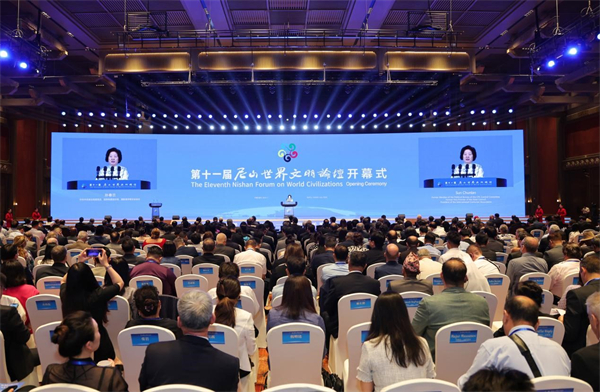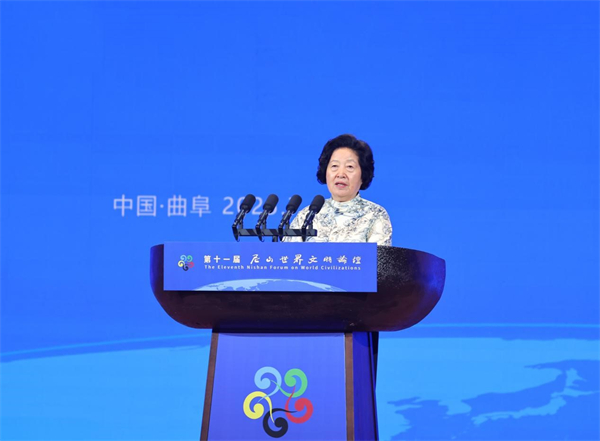

The 11th Nishan Forum on World Civilizations opened on July 9 in Qufu, East China's Shandong province, with the theme of "Beauty in Diversity: Nurturing Understanding Among Civilizations for Global Modernization".
He Wei, vice-chairman of the Standing Committee of the National People's Congress and chairman of the Central Committee of the Chinese Peasants and Workers Democratic Party; and Sun Chunlan, president of the International Confucian Association (ICA), attended the opening ceremony and delivered speeches.
Other notable speakers included Lin Wu, secretary of the Shandong Provincial Committee of the Communist Party of China (CPC) and head of the Standing Committee of the Shandong Provincial People's Congress; Chen Xu, deputy head of the United Front Work Department of the CPC Central Committee and head of the Overseas Chinese Affairs Office of the State Council; Zhao Rui, vice-president of the Chinese Academy of Social Sciences; Maldivian Vice-President Hussain Mohamed Latheef; Chhem Kieth Rethy, senior minister of Cambodia; and Jean Louis Robinson, ambassador of Madagascar to China. Zhou Naixiang, deputy secretary of the CPC Shandong Provincial Committee and governor of Shandong, presided over the opening ceremony.

Sun highlighted the forum's long-standing dedication to promoting dialogue among civilizations, contributing wisdom to addressing global challenges and advancing human civilization since its inception, adding that the forum has become a vital platform for civilizational dialogue with profound influence.
She emphasized the need to implement the Global Civilization Initiative, respect the diversity of world civilizations, embrace differences, and respect every nation's independent choice in pursuing modernization.

Sun called for appreciating different civilizations, drawing from the best achievements of humanity with an open mind, and creating new opportunities for global development through each nation's progress. She stressed the importance of focusing on common development to ensure equitable sharing of modernization benefits among all nations.
Sun noted that the ICA is willing to work with global counterparts to promote the values of equality, mutual learning, dialogue, and inclusiveness. The organization strives to bridge divides through exchange, overcome conflicts with mutual learning, and foster coexistence rather than superiority, in order to contribute to the building of a community with a shared future for humanity and promote the progress of human civilization, Sun added.
Following the opening ceremony, Chen Lai, ICA vice-president and dean of the Academy of Chinese Learning at Tsinghua University, chaired the keynote speech session.
Six distinguished scholars, including Roger T. Ames, ICA vice-chairman and humanities chair professor at Peking University; Wang Zhongjiang, president of the Chinese Confucian Academy and executive dean of the Institute for Advanced Humanistic Studies at Peking University; Steve Fuller, a fellow of the Academy of Social Sciences of the United Kingdom and professor of sociology at the University of Warwick; Ren Jiantao, professor with the School of Social Sciences at Tsinghua University; Riccardo Pozzo, professor of history of philosophy at Tor Vergata University of Rome; and Kim Sung-kee, ICA vice-president and emeritus professor at Sungkyunkwan University, delivered keynote addresses.
The forum was co-hosted by the Shandong Provincial People's Government, the Ministry of Culture and Tourism, the Overseas Chinese Affairs Office of the State Council, the Chinese Academy of Social Sciences, and the ICA. It featured two keynote speech sessions, four high-level dialogues, eight panel discussions, and seven parallel forums centered on the forum's theme and various sub-topics.

